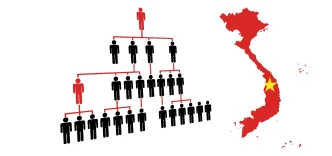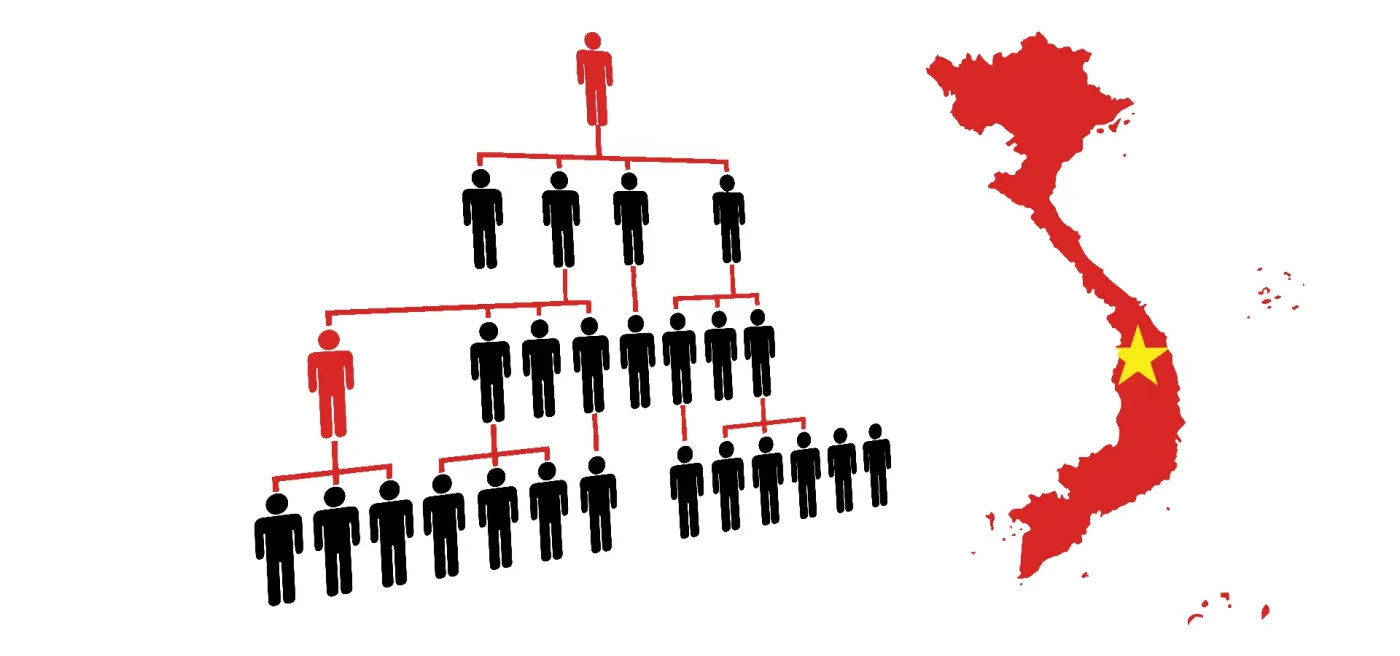In a sweeping crackdown on financial fraud, Vietnamese authorities have arrested 12 individuals linked to a sprawling multi-level marketing (MLM) scheme that allegedly defrauded thousands of victims across Vietnam and beyond, with transactions estimated in the trillions of Vietnamese Dong (VND). The operation, centered around a product marketed as a health supplement with lucrative financial returns, has exposed the vulnerabilities of desperate investors and raised urgent questions about regulatory oversight in the MLM industry.
A Coordinated Sting Across Provinces
The arrests were carried out through a joint operation involving the Lạng Sơn Province Police, the Ministry of Public Security, Ho Chi Minh City Police, and Đồng Nai Province Police. The suspects, including prominent figures such as Phạm Tuấn Phong and Đồng Thị Minh Thắng, face charges under Article 217a of Vietnam’s Penal Code, which addresses illegal MLM practices. Authorities allege that the scheme caused significant financial harm to participants, many of whom invested substantial sums with promises of extraordinary returns.
At the heart of the operation is Ame Global, a company headquartered in Kaohsiung, Taiwan, with a Vietnamese branch, WIN ALL Trading Co., Ltd., based in Ho Chi Minh City’s District 7. Investigators have identified a Taiwanese national, referred to as H.W.Y., as the alleged mastermind and director of Ame Global. The company promoted a dietary supplement called Ngưu Chương Chi, marketed not only for its supposed health benefits but also as a gateway to financial gains through a binary MLM structure.
A Pyramid of Promises
The scheme’s allure lay in its aggressive financial incentives. Participants were encouraged to invest approximately 14.8 million VND (US$570) to purchase Ngưu Chương Chi, with the promise of up to 10 percent daily commissions on global sales—potentially earning as much as US$1,000 per day. Additional bonuses, reaching up to 5 percent of income from members in up to 20 subordinate levels, were offered as further enticement. Such returns, authorities note, were often independent of personal recruitment efforts, a hallmark of unsustainable and often fraudulent pyramid schemes.
Since its rapid expansion in April 2024, the operation reportedly drew over 9,000 participants, including more than 7,000 Vietnamese, nearly 2,000 Malaysians, and a smaller number of Taiwanese nationals. The scale of the scheme, with bank transactions totaling trillions of VND, underscores the profound impact on victims, many of whom may have invested life savings or borrowed heavily to join. The transnational nature of the operation, spanning multiple countries and jurisdictions, has added layers of complexity to the investigation.
Seized Assets and Ongoing Investigations
During the arrests, police confiscated a range of assets linked to the operation, including one car, six computers, 14 mobile phones, two iPads, and nearly 15,000 empty product boxes. Additionally, over 2,000 bottles of Ngưu Chương Chi of unknown origin, 35,000 product labels, and various packaging equipment were seized, pointing to a sophisticated manufacturing and distribution network. The presence of such materials raises questions about the legitimacy of the product itself and whether it met safety or regulatory standards.
Investigations remain active, with authorities working to uncover additional accomplices and further evidence. The list of arrested individuals includes Ngô Hữu Tháp from Lạng Sơn, Lăng Thị Thùy Dung from Đồng Nai Province, and several others from Ho Chi Minh City, such as Lưu Quốc Ngọc and Trần Chấn Quyền. The diversity of the suspects’ origins reflects the scheme’s reach across Vietnam, while its international connections hint at a broader network that may extend beyond the region.
The Human Cost of MLM Fraud
Beyond the staggering financial figures, the real toll of the Ame Global scheme lies in its human impact. Multi-level marketing frauds often prey on vulnerable populations, including low-income individuals, retirees, and those seeking quick financial solutions. In Vietnam, where economic disparities remain significant despite rapid development, such schemes can be particularly devastating. Victims are frequently left in debt, with little recourse to recover their losses, while the social stigma of falling for a scam compounds their distress.
The binary MLM model employed by Ame Global, which emphasizes recruitment over product sales, is a common feature of fraudulent schemes worldwide. By promising outsized returns that are mathematically unsustainable, these systems inevitably collapse, leaving late entrants with nothing. In this case, the involvement of foreign nationals and operators suggests a deliberate strategy to exploit regulatory gaps across borders, making prosecution and restitution even more challenging.
Regulatory Gaps and Public Response
The Ame Global case has reignited debates over the regulation of multi-level marketing in Vietnam. While MLM businesses are legal under strict conditions, enforcement of these rules has often lagged behind the industry’s rapid evolution. Critics argue that loopholes in oversight allow predatory companies to operate with impunity, particularly when they target less financially literate populations. The government has introduced measures in recent years to curb illegal MLM practices, including Decree No. 40/2018/ND-CP, which outlines registration and operational requirements for MLM enterprises. However, the persistence of large-scale frauds indicates that more robust mechanisms are needed.
Public sentiment, as reflected in discussions on social media platforms, reveals a mix of anger and resignation. Many Vietnamese netizens have expressed frustration over the government’s perceived slow response to such scams, while others share personal stories of loss or caution against similar schemes. The involvement of Malaysian and Taiwanese participants has also sparked calls for greater international cooperation to combat transnational financial crime, a growing concern in an increasingly interconnected world.
Broader Implications for Southeast Asia
The Ame Global fraud is not an isolated incident but part of a broader trend of MLM schemes exploiting economic vulnerabilities across Southeast Asia. Countries like Malaysia, Thailand, and the Philippines have faced similar scams, often involving foreign operators who leverage lax cross-border regulations. In Malaysia, for instance, authorities have cracked down on several MLM companies promising miraculous health products, only to find empty promises and shattered lives in their wake. The regional nature of these crimes underscores the need for coordinated policy responses, perhaps through frameworks like ASEAN, to address shared challenges.
Economically, the fallout from such schemes can have lasting effects. Beyond individual losses, widespread fraud erodes trust in legitimate financial systems and discourages investment in regulated markets. For Vietnam, which has worked to position itself as a hub for foreign investment and economic growth, incidents like these risk tarnishing its reputation if not addressed decisively. The government’s handling of the Ame Global case could set a precedent for how it tackles similar issues in the future, balancing punitive action with preventive education.
Looking Ahead: Justice and Prevention
As the investigation into Ame Global unfolds, many questions remain unanswered. Will authorities be able to dismantle the full extent of this transnational network, or will key figures evade justice across borders? Can victims hope for any form of compensation, or will their losses be written off as a bitter lesson? Most critically, what steps will Vietnam take to protect its citizens from the next predatory scheme waiting in the wings?
For now, the arrests in Lạng Sơn and beyond serve as a stark reminder of the dangers lurking in promises of easy wealth. As the legal process continues, the focus must shift not only to holding the perpetrators accountable but also to empowering communities with the knowledge to recognize and resist such traps. Only through a combination of enforcement, education, and international collaboration can the region hope to stem the tide of financial fraud that continues to prey on the vulnerable.
















